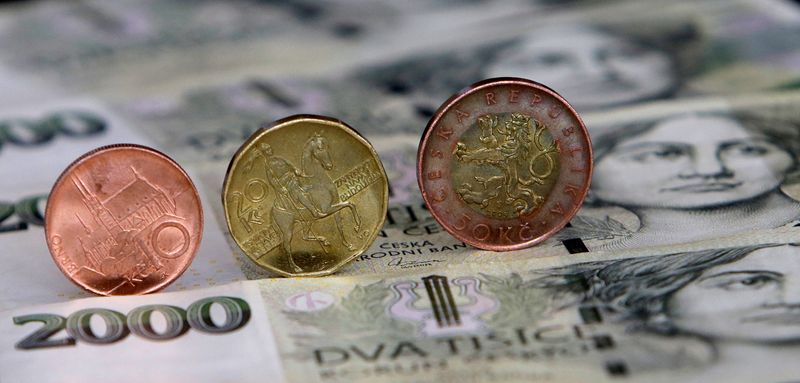By Miroslava Krufova and Alan Charlish
WARSAW (Reuters) - The Czech crown (EURCZK=) looks set to lead the charge as central and eastern European currencies bounce back over the next 12 months from recent losses on hopes of improvement in the global pandemic situation, a Reuters poll found.
September was a difficult month for CEE currencies, with the crown, the Polish zloty (EURPLN=) and the Hungarian forint (EURHUF=) losing 2-3% as rising numbers of coronavirus cases stoked fears of a damaging second wave.
However, according to the poll of 39 analysts, the crown will gain 4.6% versus Wednesday's European close to 25.80 against the euro in a year, as pandemic worries calm and the focus shifts back to fundamentals.
"While uncertainty regarding the second wave of the pandemic and regarding the impact of related restrictions on economic activity may last also in the coming weeks, I think the CEE currencies over-reacted with their recent depreciation," said Radomir Jac, Chief Economist at Generali (MI:GASI) Investments CEE in Prague.
"The macroeconomic background remains supportive for the view that the Czech crown will recover from its recent losses as soon as concerns regarding the impact of the pandemic moderate."
In Hungary, where the central bank faces a deep recession coupled with rising inflation, the forint is seen firming 1.4% against the euro to 358.50 in a year. However, expectations are less optimistic than in September when the forint was expected to be the region's best-performing currency.
"HUF is to remain under pressure mainly because of the flight to safety due to the upcoming uncertainty regarding the U.S. elections and the COVID-19 situation," said Peter Virovacz, senior economist at ING in Budapest.
"Hopefully the worst will be behind us by the second quarter of 2021 and then we will see some appreciation in the EM FX space, including HUF."
The Polish zloty, which saw its biggest intraday gain since May on Tuesday, is expected to firm 3.2% to 4.385 in 12 months.
"We expect the pandemic situation to clear up somewhat over that period (the next 12 months) and certain capital flows... to return in greater amounts than before," said Piotr Bartkiewicz, an economist at Pekao.
"I think there is material risk we will see expectations of monetary policy tightening in Poland which would be very positive for PLN even if there is no actual rate hike within this period."
Poland's key interest rate is at a record low of 0.1%, but four of the 10-member Monetary Policy Council have said the central bank should consider raising rates.

The Romanian leu (EURRON=), weighed down by the country's twin budget and current account deficits and political instability, is seen weakening 1.4% to 4.94 in a year.
